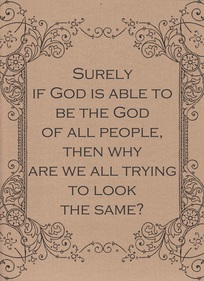|
This is the conclusion of movie/book month. I wanted to conclude with The Giver, because it allows me to bring a theological idea forward. It can transition us from a short meditation about a movie, to the hard work we are going to begin in September. The Giver is a book/movie about an apparent Utopia. There is no illness. The weather is always temperate. Everyone is content. It's only as you dig into the story you learn these perfections can only be reached by sacrificing in terrible ways. There is no illness because the very young and old are sent "Elsewhere", which is a veiled word for death. Not only is the weather temperate, everyone is temperate. Everyone takes medication to make personal weakness go away. Sameness is not possible with color, music or love, so those things don't exist in this Utopia. The story follows Jonas, a person who was chosen to be a receiver of all the memory the community no longer remembered. He learned through past events that the bad things still exist, they were just hidden within the system. I want to introduce a sentence we will dig deep into in a few weeks, but let's beginning looking at it now: How a person defines a word is more important than the word itself. If you want to know the reason I don't use high church words, it's mostly because of my denominational context. We understand that people define those words differently depending on personal context. This goes for really high church words, and simplistic church words. Actually most words have different definitions depending on who is using them. Sin, for example, can have multiple definitions. I'm not going to go into anyone else's definition, but let me give you my definition: Sin: Any action that draws us away from God. To connect to this movie, I want to talk about a specific kind of sin: communal sin. Communal Sin: When an action that draws us away from God becomes a social norm. With individual sin, a person is damaged in drawing away from God. With communal sin, everyone is damaged and the individuals who try to steer the community back to wellness is punished by the community. Let's take Martin Luther King Jr. as an example. The world was/is living into the communal sin of racism. King exhibited the highest form of moral justice by purposefully breaking the law, and accepting the punishment for doing it. Why did he break the law? Because the laws were created out of communal sin. When King broke the laws, even though those laws were wrong, he was punished for it. MLKjr wanted wellness for a broken community and was punished for seeking it: communal sin. In The Giver, Jonas wants wellness for the community. He too is going to be punished. (I won't say anymore. I suggest you check out the book, or watch the movie.) Needless to say, The Giver is a hyper-realistic view of our reality. Movies tend to go to the absurd to make a point. The question becomes: Are we too living into a communal sin we might not even realize because the sin has been accepted by the community? Something to think about. When we are living in communal sin, it's not as obvious as government mandated pills, but like those pills it numbs and blinds the problem through becoming a social norm. I'll leave you with this: What are we blind to? Are there people who are trying to draw us closer to God? Something to think about. We would love to hear from you. There are several ways to communicate and connect:
Join Fig Tree's Subreddit Follow our Pinterest page Like us on Facebook Follow us on Twitter Two days ago I went to a Mental Health First Aid (or MHFA) training. It was an eye opening experience. Just to share the top of the iceberg on what I learned. I learned, the average time a mental issue arises to the time a person seeks help for that problem, is 11 years! I also learned 1 in 4 people suffer from a mental illness at any given time. Speaking personally, I have lived through two traumatic events. The first was a familial event in my childhood. Because of this training I realized it resulted in me unknowingly self-harming through hair pulling and keeping my wounds from healing. My second traumatic event happened in the church. I believe it left me with PTSD and minor anxiety and depression. (I use the word minor, but it didn't feel minor when I was going through it. It felt like I was being weighed down into utter darkness with no release.) I was able to find tools to help me, and now I'm recovering. I am fortunate. My recovery might have been easier and got me back to a place of recovery faster, if I had a MHFA certified person there to see the warning signs and get me help. When I decided to do a movie month I had not put my schedule and my movies together. I had no idea how the clear mental issues of Howard Hughes would play into my MHFA training. There were a few things that stuck out to me.
I can tell you I left the training in a bittersweet mood. Sweet, because now I had actual steps, and a book to help me understand how to talk to someone in mental crisis. I feel more prepared. Bitter, because I feel an even deeper failure from the adults who were supposed to care for me. I'm not mad, because they didn't know they needed to do something. I was just bitter. I'm bitter for me, I'm bitter for Howard Hughes, and I'm bitter for everyone who struggles with mental illness and doesn't know how to name what they are going through. I'm here mostly for you. And, maybe it's just trauma that didn't result in upsetting a person's mental wellness. I'm here for you. (MHFA is only training to notice certain symptoms and helping people find the proper help when those symptoms are seen. It does not replace a therapist, medication, or other clinical helps the person might receive.) We would love to hear from you. There are several ways to communicate and connect:
Join Fig Tree's Subreddit Follow our Pinterest page Like us on Facebook Follow us on Twitter Naaman, a general for the king of Aram, was a great man and highly regarded by his master, because through him the Lord had given victory to Aram. This man was a mighty warrior, but he had a skin disease. Now Aramean raiding parties had gone out and captured a young girl from the land of Israel. She served Naaman’s wife. She said to her mistress, “I wish that my master could come before the prophet who lives in Samaria. He would cure him of his skin disease.” So Naaman went and told his master what the young girl from the land of Israel had said. Then Aram’s king said, “Go ahead. I will send a letter to Israel’s king.” So Naaman left. He took along ten kikkars of silver, six thousand shekels of gold, and ten changes of clothing. He brought the letter to Israel’s king. It read, “Along with this letter I’m sending you my servant Naaman so you can cure him of his skin disease.” When the king of Israel read the letter, he ripped his clothes. He said, “What? Am I God to hand out death and life? But this king writes me, asking me to cure someone of his skin disease! You must realize that he wants to start a fight with me.” When Elisha the man of God heard that Israel’s king had ripped his clothes, he sent word to the king: “Why did you rip your clothes? Let the man come to me. Then he’ll know that there’s a prophet in Israel.” Naaman arrived with his horses and chariots. He stopped at the door of Elisha’s house. Elisha sent out a messenger who said, “Go and wash seven times in the Jordan River. Then your skin will be restored and become clean.” But Naaman went away in anger. He said, “I thought for sure that he’d come out, stand and call on the name of the Lord his God, wave his hand over the bad spot, and cure the skin disease. Aren’t the rivers in Damascus, the Abana and the Pharpar, better than all Israel’s waters? Couldn’t I wash in them and get clean?” So he turned away and proceeded to leave in anger. Naaman’s servants came up to him and spoke to him: “Our father, if the prophet had told you to do something difficult, wouldn’t you have done it? All he said to you was, ‘Wash and become clean.’” So Naaman went down and bathed in the Jordan seven times, just as the man of God had said. His skin was restored like that of a young boy, and he became clean. 2 Kings 5:1-14 CEB Let's see, how many times can I preach on the same text? I wrote about how the entire text hinged on the smallest of voices. I also connected the Jordan to the Missouri. (This later one is very important to understanding where I'm coming from. I highly suggest you take a moment and read it if you are new here.) I guess, for now, the answer is three, because today I'm at it again!) This month is movie/book month. Last week we were introduced to Evan Dolive's new book: Seeking Imperfection. In the next few weeks we will look at The Aviator and The Giver. Today it's all about Cinderella! My initial experience with Cinderella was probably not your initial experience. I grew up reading illustrated fairy tales that piled up in a wicker basket in my grandma's farmhouse. One of those fairy tales was Cinderella. It was true to the original, with the stepfamily having their eyes gouged out by birds and all. I loved the Disney iteration, but it was a secondary experience for me. Since then, I've seen multiple versions, each choosing to change it's own thing. I've seen the Hammerstein musical, I've watched the Brandy Norwood version which is probably the most multicultural adaptation out there. Yes, I admit to seeing Hilary Duff try to fit into the role with A Cinderella Story. My favorite is probably Drew Barrymore in Ever After: A Cinderella Story. Then so many others, I barely remember. As our cultural identity moves towards new understandings of equality, our view of Cinderella becomes more and more difficult to tell.  The piece that always seems to stay the same in all versions of Cinderella is the extraordinary has to come from the ordinary. Cinderella is the servant of her house. Everyone in the story, except her, can get to the castle in their own carriages, and wearing their own pretty dresses. In the Disney Cartoon movie, at first even Cinderella attempts to use these methods to get to the castle. She wears her mother's dress, and tries to hitchhike on her family's carriage. Of course, it doesn't work, and Cinderella is left to cry outside the house, all hope lost. That's the way new church planting has gone for generations. Follow this exact path, look a specific way, and you will make it [to the party]. Only, so many are gently feeling nudged into new church planting, but there is no way they could follow the formula. Maybe, like Church of the Misfits they are countercultural already, and conforming will cause them to lose a piece of their unique identity. Maybe, like Jerusalem Christian Church, they are in the context of being a church birthed from a dying church. It's a context where there has to be much more intentional grace and love for what was. Maybe, like us, you have a minister who started her journey taking the traditional route, and discovered her dress in tatters; no means to get to the party. There was a time I thought the journey had be taken by knowing the right people, and dressing the right way. That just isn't always true. Like Naaman, God can take the ordinary to make the extraordinary happen. It's possible, for a plain dirty river to heal a foreign lepar. It's possible. God can take shoestring and bubblegum and change the world. John the Baptist was a zany and fool, and he was the one who started the journey for Christ. In the end, it's not about having/getting the right things; it's about God being present with the ordinary things you already have. We would love to hear from you. There are several ways to communicate and connect:
Join Fig Tree's Subreddit Follow our Pinterest page Like us on Facebook Follow us on Twitter It’s not every day that you hear a sermon where the minister brings up the topic of underwear. That’s right… underwear. To be open and honest I myself have not broached the subject either. Sure I have a heard a joke or two around the topic but never a frank, in depth discussion about it. If you were to search the Internet for a video of a minister railing against the ills of the world I’m sure underwear would be there but it would be lumped in with alcohol and some political rant not fit for the pulpit. Are there some subjects that the church is afraid to speak to or even unwilling to face head on? I am not speaking about those so called “hot topic” issues that are flooding the airwaves or social media but topics like body image or the sexualization of everything. I asked parents about their understanding of how the church is speaking the issues that are facing if not plaguing teens and tweens. Many of them stated that the church is good about promoting good teachings of morality and civility but others stated that the church was not doing a good enough job in the realm of body image. Body image is not just something saved for a random middle school church school lesson; the issue of body image is something that is being forced upon us each and every day and we as the body of Christ do not have a quality answer in response.  The Academy of Pediatrics states that every year adolescents are bombarded with 40,000 images on TV alone. Everywhere we look there is an advertisement waiting…. billboards, city buses, mall kiosks and even mobile applications. Through this medium marketers are able to shape and formulate an understanding of the ideal, of perfection with great ease. Computer manipulation with programs like Photoshop are able to take ordinary pictures and make them look unrecognizable. Through this process a standard is being set for men and women of all ages; women are to have flawless skin and be a size 2, men are to be muscle bound and enjoy hunting and fast cars. What is a young girl or young boy to do if she or he doesn't want to be in that mold? The struggle of adolescence is hard enough with hormones, changing bodies and being stuck between a kid and an adult. Why are we adding to this problem with accepting and even promoting stereotypes and body images that are attainable for 99.99% of the human population? Surely if God is able to be the God of all people, then why are we all trying to look the same? I was thrown into this world when in March 2013 I composed an open letter to Victoria’s Secret stating that I thought their marketing practices were aiming toward a younger demographic. After posting it to my blog (evandolive.com) it went viral to the tune of nearly 4 million views in a week and a half. People emailed me and told me that they too were tired of the in your face sexuality and distortion of the human body. They were ready for a change and so am I. Throughout Christian history followers of Christ and theologians have all tried to understand, quantify, qualify and articulate with precision and clarity the relationship between humanity and God. We look throughout the Biblical record to find instances of God and humanity co-mingling. In Genesis 2 we find that God is intimately connected with humanity, forming the earth and breathing into, walking around the Garden, interaction with the male and female. Has the notion of the interconnectedness of God and the image of God been lost? In a sea of applications and advertisements have been sold a product that does not match the understanding of humanity that God has set out for us? We have been told have we are created in the image of God. It has been slapped on bumper stickers and t-shirts and for some has become a rote phrase there to pacify us during times of sadness and despair.  The image of God is not something that we can take for granted; it's a deeply theological and profound thing to say that we as a human are molded, formed, created and shaped in the image of God. This changed everything! Everything about our lives, our self-esteem, our notion of God changes we accept and believe that fact that God loved and cares for you so much and God made you just the way you are. The church and followers of Christ are at a cross road in the 21st century; we know that images and marketing are in your face and distort the human form, but the answer the church has given lately is silence. This cannot be the case any longer; the church must reclaim our imperfections not as items that go against a social construct but something that makes you who you were created to be. You are beautiful, wonderful child of God created in the same of God. May we be able to proclaim boldly and proudly that we are fearfully and wonderfully made. Evan M. Dolive is an ordained minister in the Christian Church (Disciples of Christ) and Associate Minister of Family Life at First Christian Church (Disciples of Christ) in Longview, Texas. He earned his M.Div. from Lexington Theological Seminary. Dolive has appeared on Headline News, Huffington Post Live, and CNN. In 2013, People.com named him one of the "top five coolest dads" on the Internet. Dolive is married to his high school sweetheart and has three children. To order his book, it is available through Pilgrim's Press. We would love to hear from you. There are several ways to communicate and connect:
Join Fig Tree's Subreddit Follow our Pinterest page Like us on Facebook Follow us on Twitter |
Categories
All
Archives
October 2023
|




 RSS Feed
RSS Feed